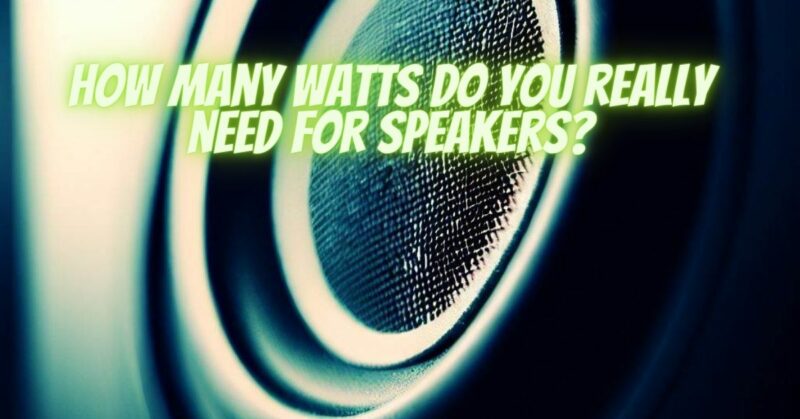When it comes to selecting speakers, wattage is a crucial factor that directly impacts the sound quality, volume, and overall performance of your audio setup. However, the question of how many watts you truly need for speakers is multifaceted and depends on several factors. In this article, we’ll dive into the considerations that will help you determine the optimal wattage for your speakers, ensuring a satisfying and immersive audio experience.
Understanding Speaker Wattage
1. What Wattage Represents:
Wattage measures the power that an amplifier delivers to your speakers. Higher wattage generally results in higher volume capabilities, but the relationship between wattage and perceived loudness is not linear.
2. Room Size and Acoustics:
The size of your listening space and its acoustic characteristics play a significant role in determining the appropriate wattage. Smaller rooms require fewer watts for adequate volume, while larger spaces might demand more power to fill the room with sound.
Listening Intentions
1. Casual Listening:
For background or casual listening, lower wattage speakers can provide enjoyable and comfortable volume levels without the need for excessive power.
2. High-Volume Playback:
If you’re aiming for high-volume playback, such as for parties or events, speakers with higher wattage are essential to maintain sound clarity and prevent distortion at loud levels.
Types of Music and Content
1. Low-Demand Music:
Genres like classical or acoustic music might not require as much power, as they often have a lower dynamic range and less complexity in sound.
2. High-Energy Music:
Genres like rock, electronic, and hip-hop with dynamic shifts and heavy bass can benefit from higher wattage to accurately reproduce the full range of frequencies and maintain detail.
Speaker Sensitivity and Efficiency
1. Sensitivity Rating:
Speaker sensitivity, measured in decibels (dB), indicates how efficiently a speaker converts power into sound output. Higher sensitivity speakers require less power for the same volume level.
2. Efficient Speakers:
Speakers with higher sensitivity ratings can achieve satisfying volume levels with lower wattage amplifiers.
Amplifier Compatibility
1. Avoid Underpowering:
Underpowering speakers can lead to distortion and damage. Ensure that your amplifier provides enough wattage to properly drive your speakers.
2. Overpowering Caution:
While ample power is crucial, excessively high wattage amplifiers can potentially damage speakers by pushing them beyond their limits.
Determining how many watts you really need for your speakers involves a thoughtful assessment of factors like room size, listening intentions, music genres, speaker sensitivity, and amplifier compatibility. Striking the right balance between wattage and the specific requirements of your audio environment will result in a satisfying and immersive sound experience. Remember that the goal isn’t always about achieving the highest wattage possible, but rather ensuring that your speakers and amplifier work harmoniously to provide clear, distortion-free sound at the volume levels you desire.


